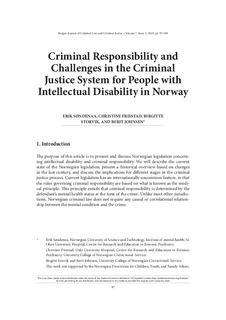Criminal Responsibility and challenges in the criminal justice system for people with intelletucal disability in Norway
Journal article, Peer reviewed
Published version

Åpne
Permanent lenke
http://hdl.handle.net/11250/2641479Utgivelsesdato
2019Metadata
Vis full innførselSamlinger
- Institutt for psykisk helse [1313]
- Publikasjoner fra CRIStin - NTNU [38679]
- Publikasjoner fra Cristin - St. Olavs hospital [1611]
- St. Olavs hospital [2579]
Originalversjon
Bergen Journal of Criminal Law & Criminal Justice (BJCLCJ). 2019, 7 (1), 97-109. 10.15845/bjclcj.v7i1.2882Sammendrag
The purpose of this article is to present and discuss Norwegian legislation concerning intellectual disability and criminal responsibility. Current legislation has an internationally unique feature, in that the rules governing criminal responsibility are based on what is known as the medical principle. This implies that criminal responsibility is determined by the defendant’s mental health status at the time of the crime. Norwegian criminal law does not require any causal or correlational relationship between the mental condition and the crime, as do most other jurisdictions. A brief description of historical perspectives and the Norwegian criminal justice system with regard to offenders with intellectual disabilities is also included.
